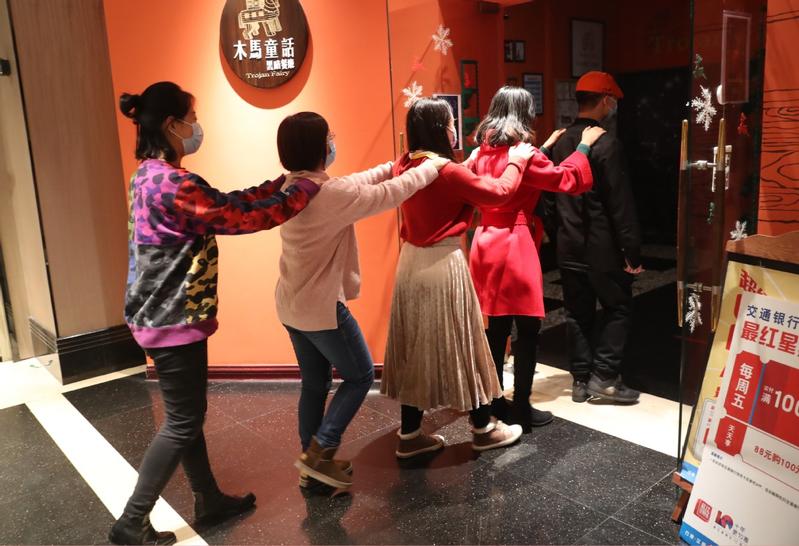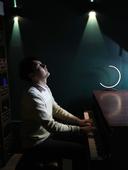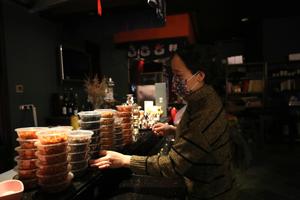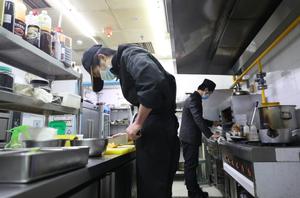Recruits facing challenges welcome new chance
 Customers are led into the Trojan Fairy restaurant in Beijing to experience dining in the dark. (ZOU HONG / CHINA DAILY)
Customers are led into the Trojan Fairy restaurant in Beijing to experience dining in the dark. (ZOU HONG / CHINA DAILY)
Yu Shuang, founder of the Beijing restaurant Trojan Fairy, posted a message on her social media account on Dec 16 asking for help with a "financial emergency".
Her business in Xicheng district was hit hard by the COVID-19 pandemic last year and owed nearly 110,000 yuan (US$16,970) in rent.
Just two days earlier, the property management company gave notice that it was terminating the lease. It also asked for the premises to be vacated within three days.
Yu's post attracted a number of comments, with some asking her what had happened. She replied, "I'm desperate."
On the day she sought help, people responded. She quickly raised the funds needed to renew the lease.
A longtime customer from the Guangxi Zhuang autonomous region, who was unable to travel to Beijing to dine at the restaurant due to the pandemic, topped up her membership card for the business by several thousand yuan.
When Yu asked why she had done so, the customer said that such a restaurant should not fail.
The eatery looks outwardly no different from many other restaurants. But inside, the lighting is dim.
On entering, customers are greeted by the sight of a piano in the reception area to the left of a dining room that offers upscale Japanese cuisine. However, to the right, a room hidden behind a curtain is in total darkness.
The concept of dining in the dark is nothing new, with the first such restaurant opening in Paris in the late 1990s.
 A customer reads a menu in Braille at the restaurant. (ZOU HONG / CHINA DAILY)
A customer reads a menu in Braille at the restaurant. (ZOU HONG / CHINA DAILY)
Loss of vision is reputed to enhance the other senses, and some of these restaurants aim to raise public awareness about blind and visually impaired people.
Trojan Fairy is one of them, but more than this, since being founded in 2009 it has offered employment and accommodations to more than 80 people with disabilities and has also been involved in other charity activities.
Zhou Haoyu, 26, the restaurant's manager, who went blind when he was a child, said: "We don't need pity. We want to have an equal opportunity to participate in society."
Yu, 49, used to be a surgeon, but in 1999 the retina of her right eye became detached and she almost lost sight in that eye. Although she recovered after treatment, she said she is still haunted by the fear of losing her vision.
As a former surgeon and also a person with a rare blood type, Yu is well aware of those in need and has been doing voluntary work for years.
She joined the blood center in Beijing, where she made donations for the 2008 Olympics.
After her daughter was born in 2009, Yu began to grow more concerned about her child's optical health. She wanted to raise people's awareness of the need to take care of their eyes and their health in general.
However, she asked herself just how many able-bodied people really empathized with the plight of the blind.
"When I founded this restaurant, the aim was to let able-bodied people experience the lives of those with disabilities-not for them to 'think' in their place, but to 'act' in their place, which will leave a more profound impression," she said.
 Zhou Haoyu, the manager. (ZOU HONG / CHINA DAILY)
Zhou Haoyu, the manager. (ZOU HONG / CHINA DAILY)
Rare disorder
Zhou, the Trojan Fairy manager, joined the business in 2013 when he was still studying musicology at Beijing Union University, working first as a part-time waiter.
He was born with a rare retinal disorder that meant he could only sense extremely faint light.
When customers arrive at the restaurant to experience dining in the dark, he asks them to put their hands on his shoulders before leading them into the darkened room.
As they wait for food to be served, he chats and jokes with them to ease any fears they may have of the darkness. He also plays the piano and sings to lighten the atmosphere.
Yu said life for the blind is particularly tough. In most cases, they seem destined to work either as telephone operators or masseurs, but Zhou is an exception.
Zhou grew up at his grandfather's countryside home in Liaoning province. His grandfather was a music lover, and although he was not a proficient player or singer, he could perform on a variety of instruments. Zhou used to accompany him to a market, where they joined performances by rural drum and gong teams.
"It is one of my happiest childhood memories," he said, adding that it began to "sow the seeds of music" in his heart.
When he reached the first grade at school, although he was placed in the front row in class, Zhou could not see anything written on the blackboard, and was always second from last in every exam. The bottom-placed student had polio.
One afternoon after school in 2001, Zhou followed a classmate, who was a neighbor of his, back home as usual, holding on to the boy's schoolbag and struggling to keep pace with him.
It was already dark and very quiet, with only the sound of the wind blowing through the wheat as they walked through a field. Suddenly, the boy shook Zhou off for no reason. Zhou fell to the ground, but the boy ran off laughing.
Zhou was eventually found by his father, who took him home. After this incident, his parents decided to send him to a special school.
The school placed great importance on the interests of each student, especially in the arts, and every newcomer had the opportunity to learn the flute and harmonica, Zhou said. His parents also sent him to an extracurricular class to learn electronic keyboard, where he met his music teacher, Pan Xiaomei.
With Pan's help, Zhou joined a small band at school as a keyboard player when he was 11, featuring in scores of performances.
Zhou grew up with people telling him he would become a masseur. Influenced by their opinions, he told others that he would be a good masseur to relieve people's pain, but deep down he knew that he wanted to pursue a career in music.
In 2013, he was admitted to Beijing Union University with the highest score in the country.
At university, he took part in many activities and headed the choral and folk music clubs. In his first year, he was referred by a senior student to Trojan Fairy, where he applied for the position of part-time pianist.
Since then, along with Zhou, the restaurant has hired four blind people and another two, who play violin and trumpet, to form a band to play at the eatery.
The violinist was later admitted to the University of Sheffield in the United Kingdom to continue his music studies.
In addition to guiding customers to their meals and managing daily operations at the restaurant, Zhou, who is a licensed piano tuner, uses his spare time to tune these instruments across Beijing and also gives livestreaming performances at night.
His idol is the Italian tenor Andrea Bocelli, who went blind as a child. Zhou dreams of being able to sing just like him.
"With the experience I have gained, I feel I can overcome all difficulties. I hope to do what I can to help those who are suffering in the dark, like I once did," he said.
 Yu Shuang, founder of the business. (ZOU HONG / CHINA DAILY)
Yu Shuang, founder of the business. (ZOU HONG / CHINA DAILY)
Horrific accident
Du Chuanwang, a waiter who joined Trojan Fairy in 2019, has worn a mask every day while serving food-not because of the pandemic, but to avoid diners seeing his face.
Born in 1999 in Shandong province, Du was involved in an accident in 2012 during a prank with two mechanics using an air pump.
The incident left him with horrific injuries to his internal organs and nose. It happened after Du dropped out of school at age 13 and was sent by his father to work as an apprentice at an auto repair shop.
Du was sent to the hospital with injuries to his intestines, bleeding to the stomach, and weakened liver function. He was later transferred to a hospital in Beijing for further treatment.
His life was saved, but the accident left him with weakened immunity and unable to chew and digest solid food. He also lost his nose and surgeons had to create a new one by using skin taken from his forehead.
Du's case was taken up by the Beijing AngelMom Charity Foundation, which has been looking after him.
Before joining Trojan Fairy, Du worked at an orchard for a short time with others who had been injured in accidents.
In December 2018, Du's guardian dined at Trojan Fairy, where he was surprised to find that many workers with disabilities were able to take up such work, rather than being placed in employment by welfare agencies. The guardian contacted Yu, the founder, to ask if his charge could work for the business.
Yu met Du the following month, and remembers the day well, as the potential recruit was wearing a dirty, thin cotton jacket designed for a woman. Du was also shy, kept his head low and refused to talk to others.
When Yu took him to the kitchen to seek the views of other workers, they all said Du should stay, as it would be good for him to learn a skill and earn his own living.
As a result, Du joined the eatery, where along with able-bodied staff members, he is not only paid but has free meals, accommodations and insurance cover.
However, a week after Du arrived, the head chef's girlfriend went to the restaurant. Frightened by Du's appearance, she reacted violently. Her boyfriend then approached Yu and told her he would quit if Du remained at the business.
Yu said: "The head chef had been with us for more than nine years. If he left, I thought the business would collapse.
"But Du didn't do anything wrong. I consulted everyone and they said there was no problem. If I had asked him to leave, it would have caused him more harm."
The head chef ended up leaving, and his job was taken by the sous chef, who began to teach Du kitchen skills.
Du cherished his job. He was initially slow, but worked hard and can now perform many tasks, such as making salads, searing steaks and even baking.
The friendly working atmosphere at the restaurant has also made him more outgoing. Although still shy with strangers, he now jokes with people he knows well.
In December, the AngelMom Foundation wrote an article on the progress made by Du since he joined Trojan Fairy.
"Weakness was no reason for him to give up developing. Du has grown into a very good cook. Before, it was Trojan Fairy who sheltered him. Now, it is Du who contributes to Trojan Fairy," the article stated.
 Du Chuanwang (left), a waiter. (ZOU HONG / CHINA DAILY)
Du Chuanwang (left), a waiter. (ZOU HONG / CHINA DAILY)
The future
The restaurant now has five employees. In addition to Zhou and Du, it has hired Xinyu, who has mental difficulties, Chenchen, an orphan who is visually impaired, and an able-bodied worker surnamed Wang.
Although she stammers, Xinyu, who is in her 30s and joined the restaurant about two years ago, said this is her first steady job and she feels happy working there.
At first, she often broke glasses, but has since become familiar with all her duties and has learned to make drinks and ice cream.
Yu said: "My goal in setting up this restaurant is to train employees and help them integrate socially. My principle is to offer help, but I won't offer assistance that weakens abilities.
"What they need more than anything is to be involved in social activities, not to remain in welfare institutions.
"China has a large population with disabilities. We may experience some physical inconvenience at some stage in our lives. How we see and treat those in wheelchairs today will be reflected in the way others treat us in the future. This affects everyone."
zhangyangfei@chinadaily.com.cn


